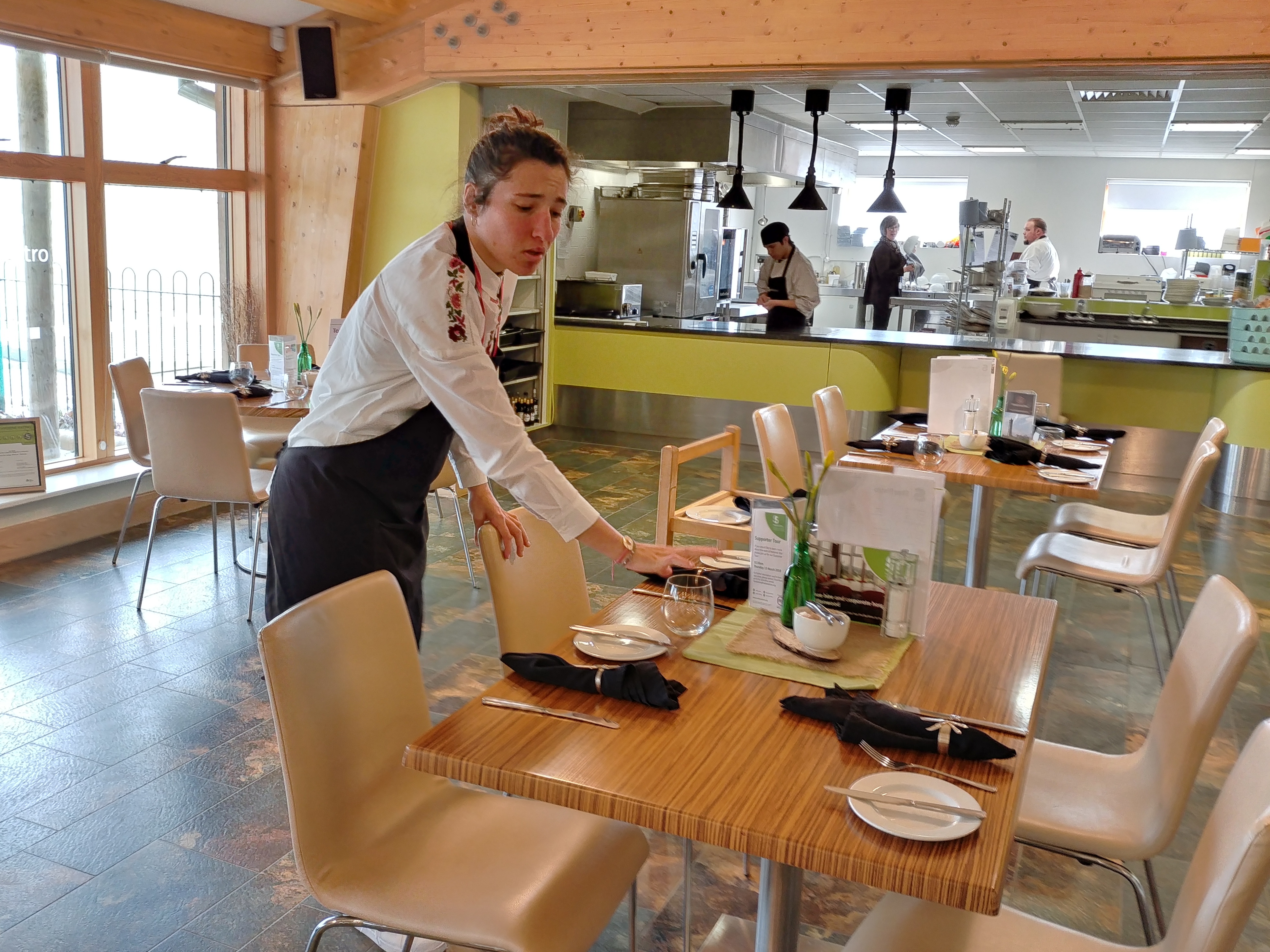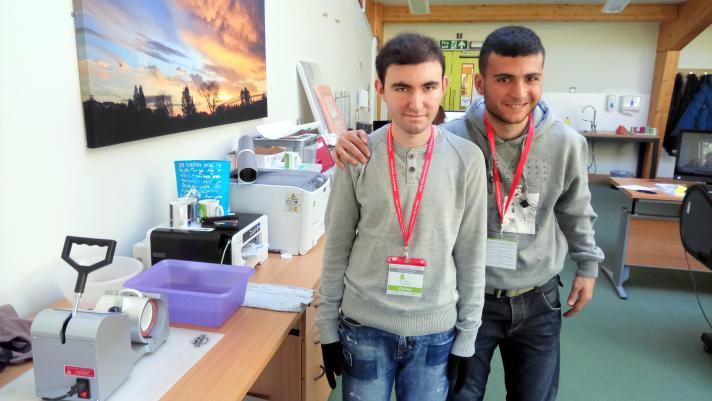
Topic(s) addressed
The "EmployAble" mobility project was implemented in cooperation with the National Star Specialist College, Cheltenham (the UK), and lasted for a period of 2 years. The project’s main purpose was the acquisition of know-how and good practices towards the promotion of young people with disabilities in the labour market and increased effective employment. The programme included two parallel actions of staff training and the training of SEN students. The first action was attended by a total of 25 teachers from our school who were trained to support employment, provide professional guidance and mentoring, as well as support the structure and operation of social enterprises. The training goals set for teachers were for them to be introduced to the British legal frame regarding the employability of young people with special needs (targeting practical exercise and function of social enterprises), and to enable them to design individual vocational programmes; become acquainted with modern specialised teaching techniques/methods; convey and apply good practices regarding labour market research and identify employers who offer employment to people with disabilities; apply techniques to support students at their workplace and their employers; and gain and convey technical knowledge regarding the organisation of social enterprises and their function. Trainees had the opportunity to meet work mentors, visit working environments where disabled students were employed and watch the process of providing work support work for both young people and employers. The second action was attended by 30 of our students who were in turn supported by 15 teachers (all of whom were posted in supported work placements at National Star College social enterprises). The training objectives for said teachers were to build their existing technical and job competencies and develop new ones; experience different learning practices; improve their English language competence; gain experience of work environments and develop an ability to adapt; cultivate a sense of belonging to the group and develop cooperativeness; and interact with young people from different cultures and become acquainted with different values and attitudes. Furthermore, teachers were trained to feel more like European citizens; build their self-image and self-evaluation; boost their social skills and social adaptation; increase their chances of employment; and, above all, to lead autonomously and independently.
Target groups
Target groups consisted of both teachers and students, with the former consisting of 25 Greek individuals who were education and specialised scientific staff from the Educational Centre of Vocational Training for Adolescents and Young Students with Disabilities (EKEK AmeA), Thessaloniki, and the Man Power Employment Organisation (OAED) – both of which came with many years of experience in the field of Special Education and Training. Furthermore, the project also saw the participation of teachers from diverse fields including Special Education, IT, music, PE, art, weaving, sewing, agriculture, and carpentry, as well as nurses, social workers. The 30 Greek students on the other hand, were between the age of 19-31, and came from the Educational Centre of Vocational Training for Adolescents and Young Students with Disabilities (EKEK AmeA) Thessaloniki, Greece.
Methodologies
The National Star College, having considerable experience in supporting employment and social enterprises, was the project’s host organisation. With regard to staff training, all of the programme’s original goals were fully realised, with teachers having had the opportunity to get in touch and cooperate with experienced job coaches and college mentors. Participants’ dialogue and self-motivation were implemented in an interactive manner through a number of teaching techniques such as case studies, role-playing, brainstorming, teamwork, and lectures. Furthermore, teachers familiarised themselves not only with the legal framework that determines the employment of people with disabilities in the U.K. (particularly in the fields of internship and social enterprises), but also with the procedure through which local market research is conducted so as to ensure job placement for the disabled. Teachers were mostly offered the opportunity for job shadowing through visits to a considerable number of different workplaces where young people with disabilities were employed, so as to understand the way in which these young people and their employers were being supported. During these visits, teachers (each teacher was paired with a mentor) were able to converse with both employees and their employers, while job coaches were open to dialogue and were willing to answer questions and discuss any concerns. Moreover, when the training took place in the college’s social enterprises, trainees were given the opportunity to actively participate in the role of a job coach. Likewise, in the case of students, the programme’s initial goals were fully achieved through the implementation of work-based learning. The students, having become acquainted with the staff and college premises during the previous Erasmus+ programme, were placed in work places in the college’s social enterprises (specifically in the sectors of printing, customer services, cooking, and restaurant services). In this manner, they were given the opportunity to work in actual work environments with the support of job coaches and college mentors, as well as accompanying teachers. They also attended classes on the English language, and British culture and civilisation. The project’s teaching techniques boosted participation, cooperation, communication, and a sense of belonging to a team, with group activities devised in such a way so as to enable our students to interact with British students.
Environments
Part of staff training was carried out in the classrooms of the National Star College, which was fully equipped with state-of-the-art facilities; however, the greatest part of the training component was carried out in the college’s social enterprises with a vast array of working places where young people with disabilities are employed. This variety of different work environments (supermarket, restaurant, hotel, horse-riding establishments, carpentry workshop, greenhouses, public service, graphic design shop, hospital) where young people with varying degrees of disability were employed, combined with the optimum cooperation of job coaches, enriched the overall experience of trainees in an experiential, direct, and efficient manner. Student training occurred primarily in actual work environments that were open to the public, for instance at Starprint (a printing enterprise) where they were trained to design logos; stamps on cups, fabric, and wood; and familiarised with machinery, tools, electronic equipment, and the enterprise’s modus operandi. It is worth mentioning that a project was carried out for the first time at said printing enterprise by the students of our school (with the support of the IT department), with the objective of understanding how to use a 3-D printer in order to print an apartment’s floor plan using special signage, so as to facilitate the orientation of people with sight problems. The enthusiasm showed by our students was immense, given that they were a part of a project with such massive social importance, which was extensively covered by the British media. Students also acquired work experience at StarBistro, where they learnt about restaurant services (both in front and behind the counter) such as cooking, setting tables, serving, taking orders, and using a coffee machine. Another establishment known as Starshop (which sold food and beverages), saw students learning how to use a cash register, carry out inventories, and check supplies and food quality control. Moreover, students were placed in the college’s administrative office, where they were offered the opportunity to perform auxiliary tasks such as the selection and distribution of mail, and use of the copy machine and the machine that calculates postal fees. Finally, our students also worked in the culinary sector (in the college’s professional kitchen), where they prepared meals and desserts that were sold in nearby cafes and bistros under real-life work conditions. It should be highlighted that this project marked the first time that Greek students with disabilities had travelled abroad for training and the acquisition of real-life work experience in actual work environments.
Teachers
Teachers enriched their professional qualifications, as well as their professional prospects through their acquisition of international experiences; additionally, they acquired know-how and specialised professional skills and practices in counselling, work support, and the guidance of people with disabilities so as to be able to successfully integrate them into the labour market through training sessions in the field of supported employment. On an emotional and social level, this resulted in an increase to their self-confidence and cooperation. The mobility programme contributed to the broadening of teachers’ professional horizons and the enrichment of their professional skills, while on an emotional level, their self-image and self-respect were substantially reinforced, with an increase in their ability to cooperate and adjust to new environments and surroundings. In general, the interaction and interplay found in a modern international environment that respects diversity allowed our students to acquire life skills with regard to professional and social inclusion, and, therefore, towards independence and autonomy.
Impact
Teachers were completely satisfied with the mobility programme, and believe that the project’s main goal was successfully accomplished with regard to their acquisition of know-how, specialised knowledge, and the required skills towards their promotion of young people with disabilities within the labour market – all of which improved the services being offered by our school. Our students were also equally satisfied with the learning mobility programme, with the vast majority having worked in an actual work environment for the first time, which boosted their self-confidence immensely and made them feel capable, useful, and self-confident. Students spoke enthusiastically about the opportunity they were given to travel and stay abroad by themselves, without parental supervision. They were also delighted that they had made new friends from another country, with all of them prepared to participate in a future similar programme. Participation in the Erasmus+ programme also had an immense impact on the structure and operation of our school, for instance, in December 2018, the Standard Craft Unit of Lakkia (PVM Lakkias) transformed into what is today the Educational Centre of Vocational Training for Adolescents and Young Students with Disabilities (EKEK AmeA) of Thessaloniki, of the Man Power Employment Organization. The establishment of the same (according to European models), substantially reinforced the promotion of our graduates into the labour market, as their integration had previously proved to be particularly difficult. We consider this school-to-workplace transition to be facilitated by ΕΚΕΚ ΑμεΑ, mainly through Sheltered Workshops, the operations of which began in the 2019/2020 school year, and which constitutes an innovation for Greece. The innovative factor lies in the fact that for the first time in the realm of public special vocational education and training, a form of sheltered paid job was being offered, which gave young people the opportunity to work either in the Centre’s sheltered workshops, or with cooperating companies from the private and public sectors. The recognition of our school has increased tremendously, as we are constantly invited to participate in a plethora of actions at the national and international levels, so as to transfer and disseminate our acquired know-how from our participation in the Erasmus+ programme; moreover, our number of new students has also risen dramatically. ΕΚΕΚ ΑμεΑ of Thessaloniki is expected to become a pilot in the organisation of the operation, structure, and at the administrative and educational levels for similar schools in Greece and abroad. The same is true for funding organisations that manage vocational training, professional rehabilitation, and manpower programmes. At the same time, we are also in the process of funding a social enterprise on the school’s premises. We consider our programme to be truly innovative, given its breakthrough effect in Greece’s special vocational education and training, with its impacts reflected in every aspect of our school’s operation. The knowledge and skills that were acquired by both staff and students have led to the school’s modernisation, upgrade, and renewal; in sum, participation in the Erasmus+ programme was a truly strong and unique experience that facilitated teachers’ and students’ self-confidence and optimism.
- Reference
- 2016-1-EL01-KA102-022899
- Project locations
- Greece
- Project category
- VET schools
- Project year
- 2021
Stakeholders
Participants
National Star Foundation
- Address
- United Kingdom

